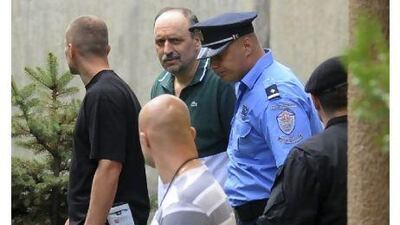LONDON // With one landmark United Nations tribunal preparing to put on trial those allegedly responsible for the assassination of a former Lebanese prime minister, another UN special court is entering its final lap, having set a standard of accomplishment few thought possible.
In what one jurist has called a "truly great achievement", the wanted list of the International Criminal Tribunal for the former Yugoslavia (ICTY) is now empty after the arrest in July of Goran Hadzic, a former Croatian Serb general accused of involvement in ethnic cleansing in Croatia.
The UN court, based in The Hague, has tried or begun proceedings arising from 161 indictments for genocide, war crimes and crimes against humanity allegedly committed during the Balkan wars of the 1990s. No more indictments remain to be served.
High-profile cases are among those still to be decided. The summer recess over, the ICTY's first business tomorrow will be the continuing trial of Radovan Karadzic, the former Bosnian Serb leader whose alleged crimes include genocide. Later in the day, the joint prosecution of Jovica Staniši, the former head of Serbian state security, and Franko Simatovi, who led the late Yugoslav president Slobodan Milosevic's secret police, resumes. Both are accused of involvement in the massacre of non-Serbs in Bosnia and Croatia.
The beginning of the end of the ICTY's work comes just as the Special Tribunal for Lebanon (STL), also in The Hague, prepares to go the courtroom for the first time. It has indicted four members of Hizbollah for their purported involvement in the 2005 killing of Rafiq Hariri, the former Lebanese premier. Unless they are arrested by Lebanese authorities or turn themselves, the men will be tried in absentia, sources at the tribunal said over the weekend.
There is no denying that the Lebanon and Yugoslavia tribunals - just two examples of the system of international justice that has proliferated in the past two decades - have their critics.
Some view these UN-created special courts and the permanent International Criminal Court as spendthrift institutions that are excessively politicised and biased in favour of western nations.
Those who applaud the ICTY believe, however, that as an instrument to hold leaders accountable and bring justice to victims, its track record compares favourably with the pursuit of suspected Nazi war criminals after the Second World War.
While 13 of those indicted have been acquitted, 64 have been sentenced to prison terms. The remainder have either had their indictments withdrawn or have died, or have been referred to national courts.
James Gow, a London academic who served as a prosecution adviser and expert witness in the tribunal's earlier days, believes the court can claim unrivalled success.
"Nuremberg missed [Martin] Bormann and [Adolf] Eichmann, at least, while Rwanda has several indictees outstanding," he told Reuters. "Even if not all the trials have gone well - Milosevic stands out here both because he died before the end but also because of the way it was conducted - it is a truly great achievement."
The ICTY was created in 1993 to investigate atrocities committed during fierce conflicts between Croats, Serbs, Bosnian Muslims and Albanians. Casualty estimates from all the Balkan wars from 1991 to 1995 vary from 25,000 to more than 250,000 amid suspicion that the figures have been manipulated according to partisan interests.
The tribunal claims to have "irreversibly changed the landscape of international humanitarian law and provided victims an opportunity to voice the horrors they witnessed and experienced".
The tribunal adds that in the decisions it has reached on war crimes, it has shown that high rank or political office do not provide an individual protection from prosecution.
One of the most important rulings, made in 2004, held that the killing of an estimated 8,000 Bosnian Muslims by Bosnian Serb forces in 1995 amounted to genocide.
In Serbia many citizens continuing to regard alleged war criminals as national heroes while the government is eager to present itself to the world with clean hands, fit for inclusion within of the EU.
But a British peer, Lord Ashdown, a prominent centrist politician and former military commander who served as the high representative for Bosnia and Herzegovina from 2002 to 2006, echoes Prof Gow's acclaim for the tribunal.
"The truth about the Balkans, as elsewhere, is that you cannot have peace without justice," he said.
It was right not to pursue thousands of relatively minor war criminals, but bringing to justice the "principal architects" had been essential. Only by establishing a system of international law in the field of conflict could the world hope to navigate the probable turbulence of coming decades.
Lord Ashdown said that while atrocities were committed by all parties to the conflict, Serbs were responsible for 75 to 80 per cent.
Doubts persist. Reuters quoted one Dutch international lawyer, Geert-Jan Knoops, as expressing misgivings about the timing of the arrests of three high-profile defendants: Mr Karadzic, Mr Hadzic and Ratko Mladi, a former Bosnian Serb military commander facing charges of terror, attacks on civilians and hostage-taking. It seemed "more than a coincidence" that they should have been tracked down at a time politically and economically suitable for Serbia, he said.
Prof Gow said some Muslims feel the tribunal has not gone far or quickly enough in its efforts to punish people guilt of war crimes. However, Lord Ashdown said that while war in Bosnia was "one of the great recruiting sergeants" for Islamist activists, he was amazed at the extent to which Bosnian Muslims had rejected extremism.
The tribunal's work was scheduled to be concluded by 2014, though the date for all trials and appeals to be completed may be pushed back to the following year.
"It is not elegant sometimes," said Lord Ashdown.
"It is not tidy and does not always work in ways that satisfy everybody. But it is a major step forward in terms of the international rule of law."


